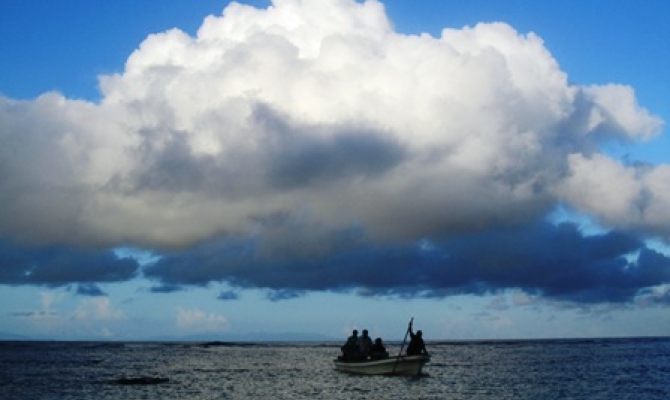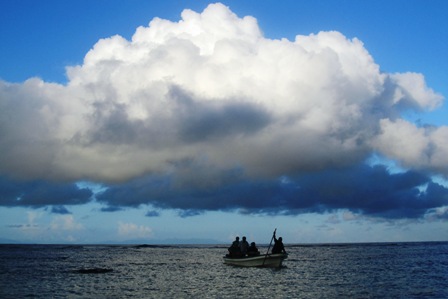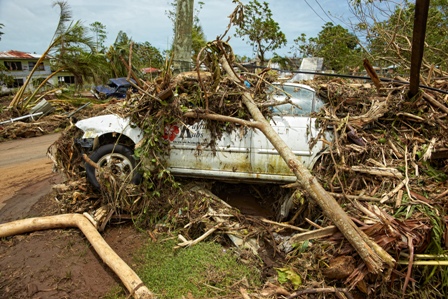
Climate Change Resilience
SPREP congratulates the World Meteorological Organization (WMO) on their resolution to establish a new programme dedicated to Small Island Developing States (SIDS) and Member Island Territories.
The programme supports the SIDS Accelerated Modality of Action (S.A.M.O.A.) Pathway to increase their resilience to extreme weather events and other adverse impacts of climate change.

"We're very encouraged by this new move from the WMO that will ultimately benefit the capacity of National Meteorological and Hydrological Services and our Pacific island communities," said Dr. Netatua Pelesikoti, the Director of the Climate Change Division of SPREP.
"This new Programme to enhance weather, climate, water and other environment related services in our island member countries and Island territories further builds upon the work that we do here at SPREP in collaboration with WMO and other partners."
The Principal Delegate of Tonga at the 17th World Meteorological Congress and also the Director of the Tonga National Meteorological Services, Mr 'Ofa Fa'anunu and with the support other delegates from the SIDS regions called for and appealed to the 17th World Meteorological Congress to establish the new Programme for SIDS and Member Islands Territories.
The proposal was supported by all SIDS and Islands Territories in Africa including the Indian Ocean, the Caribbean and the Pacific.
"I am extremely pleased with this outcome at the World stage that WMO and its Members have recognised that SIDS and Island Territories have specific needs and must be assisted and not left behind. Now SIDS and Island Territories have an identity within WMO," said Mr. Fa'anunu.
"The challenge now is to establish a work plan and work closely with WMO, SPREP and Development Partners in this next 4years to establish and to mobilise resources to fund this program."

Since 1970, more than 650 hydro-meteorological disasters have impacted SIDS and Island Territories, affecting more than 35 million people and causing approximately US$ 34 billion in damage.
In the latest example, Cyclone Pam caused massive devastation in Vanuatu and other Pacific islands. Accurate early warnings and disaster preparedness limited the human casualties, but the socio-economic cost was huge.
While many SIDS and Island Territories are already work to strengthening their weather and climate services in their respective countries, economies are small and isolated geographically and are highly exposed and vulnerable to natural hazards.
"It's still in the very early stage so commitment and resources are needed to get the Program off the ground and to get it firmly established within the WMO Budget framework in years to come," said Mr. Fa'anunu.
"I am extremely proud of what the Small Islands Developing States and Island Territories achieved at this 17th World Meteorological Congress and the support given by the more Developed Nations of WMO for the establishment of this Program. We have our work cut out for us now and in to the future but this is a good start."
The 17th World Meteorological Congress was held in Geneva, Switzerland from 25 May to 12 June this year. The WMO Office for the South-West Pacific is based within the SPREP campus in Apia, Samoa and is a partner in the Pacific Met Desk Programme.
For the full WMO media release please visit: https://www.wmo.int/media/content/wmo-sets-new-small-island-developing-states-programme
The programme supports the SIDS Accelerated Modality of Action (S.A.M.O.A.) Pathway to increase their resilience to extreme weather events and other adverse impacts of climate change.

Photo - Carlo Iacovino
"We're very encouraged by this new move from the WMO that will ultimately benefit the capacity of National Meteorological and Hydrological Services and our Pacific island communities," said Dr. Netatua Pelesikoti, the Director of the Climate Change Division of SPREP.
"This new Programme to enhance weather, climate, water and other environment related services in our island member countries and Island territories further builds upon the work that we do here at SPREP in collaboration with WMO and other partners."
The Principal Delegate of Tonga at the 17th World Meteorological Congress and also the Director of the Tonga National Meteorological Services, Mr 'Ofa Fa'anunu and with the support other delegates from the SIDS regions called for and appealed to the 17th World Meteorological Congress to establish the new Programme for SIDS and Member Islands Territories.
The proposal was supported by all SIDS and Islands Territories in Africa including the Indian Ocean, the Caribbean and the Pacific.
"I am extremely pleased with this outcome at the World stage that WMO and its Members have recognised that SIDS and Island Territories have specific needs and must be assisted and not left behind. Now SIDS and Island Territories have an identity within WMO," said Mr. Fa'anunu.
"The challenge now is to establish a work plan and work closely with WMO, SPREP and Development Partners in this next 4years to establish and to mobilise resources to fund this program."

Cyclones in the Pacific islands continue to wreak havoc - photo S. Chape
Since 1970, more than 650 hydro-meteorological disasters have impacted SIDS and Island Territories, affecting more than 35 million people and causing approximately US$ 34 billion in damage.
In the latest example, Cyclone Pam caused massive devastation in Vanuatu and other Pacific islands. Accurate early warnings and disaster preparedness limited the human casualties, but the socio-economic cost was huge.
While many SIDS and Island Territories are already work to strengthening their weather and climate services in their respective countries, economies are small and isolated geographically and are highly exposed and vulnerable to natural hazards.
"It's still in the very early stage so commitment and resources are needed to get the Program off the ground and to get it firmly established within the WMO Budget framework in years to come," said Mr. Fa'anunu.
"I am extremely proud of what the Small Islands Developing States and Island Territories achieved at this 17th World Meteorological Congress and the support given by the more Developed Nations of WMO for the establishment of this Program. We have our work cut out for us now and in to the future but this is a good start."
The 17th World Meteorological Congress was held in Geneva, Switzerland from 25 May to 12 June this year. The WMO Office for the South-West Pacific is based within the SPREP campus in Apia, Samoa and is a partner in the Pacific Met Desk Programme.
For the full WMO media release please visit: https://www.wmo.int/media/content/wmo-sets-new-small-island-developing-states-programme